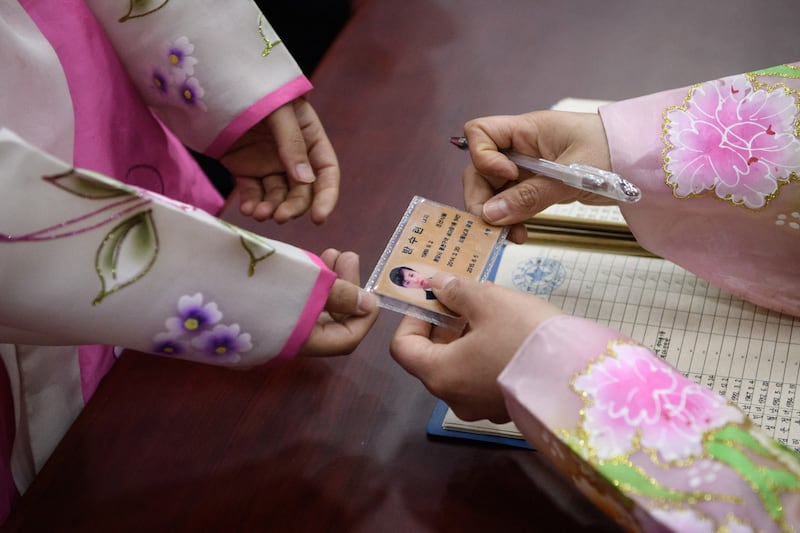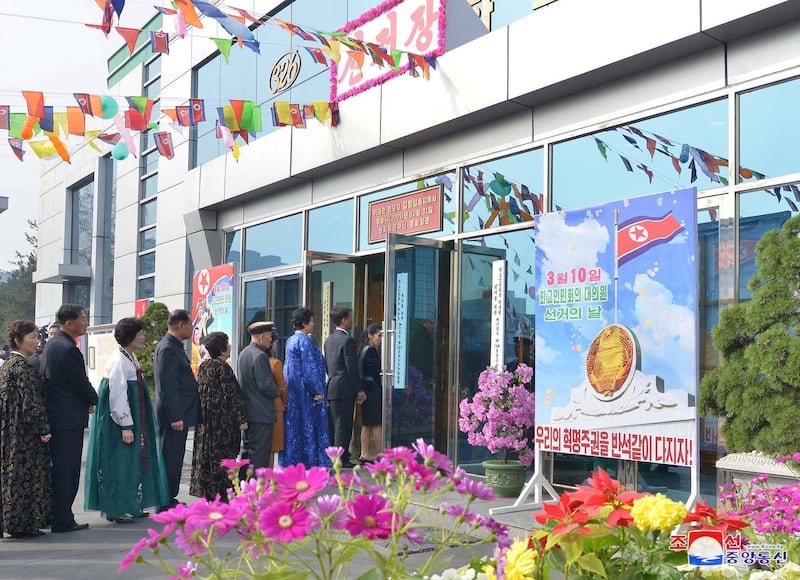For the first time since the country’s founding in 1948, North Koreans were given a choice between two candidates in an election, residents told Radio Free Asia, puzzling people accustomed to simply voting for the single, party-approved candidate.
Two women ran in a Nov. 4 primary election in the northern city of Hyesan, which borders China in Ryanggang province, to determine a candidate for the provincial People’s Assembly, a resident who requested anonymity for security reasons told RFA Korean.
The two candidates were “Choe Hye Yong, born in 1979, a manager at the Food Administration Office in Ryanggang province, and Kim In Hui, born in 1973, the finance manager at the Aprogak restaurant,” the person said.

The possibility of a choice — and the use of secret ballots – generated both confusion and interest among voters, another Ryanggang resident said.
“For the first time, some people were unfamiliar with the voting method to select candidates for the provincial People's Assembly,” he said. “Interest in elections has grown among the residents who have now had the taste of [choice] in these preliminary elections.”
Choe emerged victorious from the primary, and will run unopposed for a seat in the provincial People’s Assembly elections on Nov. 26, the first source said. The assembly is a largely rubber-stamp body that purports to represent the will of the people on the provincial level, but in reality simply ratifies the policies of the central party.
“[Choe] has worked in the food sector for a long time, and she received more than 70% of the votes in her favor,” she said. “The residents say she is the person who can solve our food problems.”
Showing loyalty
Elections in North Korea have always been a closely monitored, compulsory event where women wear traditional clothing and men wear their finest suits to declare their loyalty to the party by choosing the only option available, all with party officials watching their every move.
This is why voter turnouts are always near 100%, and every candidate is assured to get close to 100% of the vote.
But secretly, citizens have complained that elections are nothing more than a political show.

Elected bodies in North Korea hold almost no real power. They simply carry out the will of the ruling Korean Workers’ Party, which in turn follows the will of the North Korean leadership. On the local level the elections occur every four years.
On the national level, the Supreme People’s Assembly is the highest state power organ, and elections are held every five years, most recently in 2019.
The new voting system is likely an attempt by the country’s leader Kim Jong Un to show measurable change to the people, a former high-ranking North Korean official who fled from the North and resettled in the South in 2015, told RFA.
“The fact that multiple candidates are running in the election is meant to show that Kim Jong Un is bringing about changes in national policy,” he said on the condition of anonymity for the safety of his family still in North Korea.
“Rather than just oppressing people by coercively regulating and controlling them and making various laws, the idea is to give a signal that says, ‘In this way, I will give freedom to residents and bring about democratic changes in social development and national management.’”
But the changes in the election process are merely cosmetic, and at its core, the North Korean regime has not and will not change, he said.
“The introduction of democratic methods in this election is a small change, but it is not a major change in North Korean society,” the former official said. “I think it must be a bit of a democratic imitation.”
Contested elections on the national level were held in Soviet-occupied North Korea on Aug. 25, 1948, prior to the nation’s official founding later that year, with 228 candidates contesting 212 North Korean electoral districts.
These elections were held separately from the U.N.-sponsored elections on May 10, 1948, in South Korea, that had originally been intended to be held also in the North, but were refused by the Soviets and their preferred leader Kim Il Sung, the current North Korean leader’s grandfather.
In every subsequent election held in North Korea, voters were given a choice of only a single candidate for each race.
Translated by Claire Shinyoung Oh Lee. Edited by Eugene Whong and Malcolm Foster.
